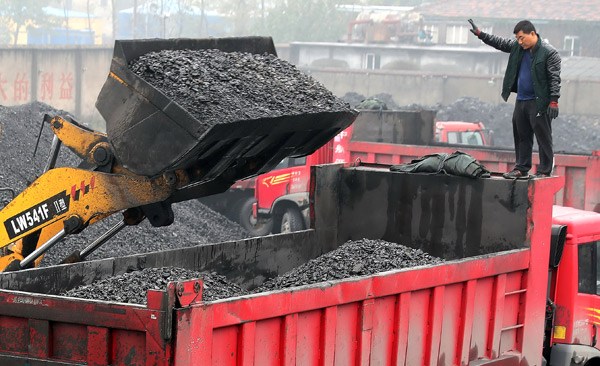
A heavy-duty lorry receives coal load at a yard in Huaibei, Anhui province. Prices of coal and metals have risen this year, boosting profits and shares of listed companies in the sectors concerned. TIAN SHENG / FOR CHINA DAILY
Small tech shares out of favor due to fear of tighter regulation, high PE ratio and hopes of rise in IPOs
A rise in IPOs, expectations of stricter policy and high PE ratio are likely to hurt stocks of small technology companies as both retail and institutional investors in the equity market are increasingly favoring shares in commodity companies.
Shares in small companies in IT, biotech and new material sectors that have been in a tailspin of late, are expected to slump further, while coal, steel and nonferrous metal stocks are tipped to coast on the respective companies' brightening business performance.
"Investors are chasing stocks of listed companies with low valuations and good performance, and steering clear of stocks hyped up on concepts like 'technology-is-future'," said Zhan Jianwen, senior investment manager at China Investment Securities.
The last two years have seen a meltdown of the ChiNext Startup Index, which comprises many small tech stocks. On Friday, the index closed at 1734.07, down 57 percent from its record high of 4,037.96 on June 4, 2015, when the descent from the peak started.
Since June 2015, shares of 230 companies on the ChiNext fell more than 50 percent; 43 of them tumbled more than 70 percent; and 10, including well-known Dadong Xintai Electric and Qtone Education, crashed more than 80 percent.
Market-people attribute some of that meltdown to fears that financial regulations are likely to get stricter. A potential crackdown on accounting frauds and other illegal practices by listed small technology companies is believed to be imminent.
In addition, expectations of an IPO flood, and restrictions to preempt shadowy mergers and acquisitions or M&A aimed at boosting weak shares, have hurt the ChiNext Index, said Fu Jingtao, a market strategist with Shenwan Hongyuan Securities.
Regulators have been emphasizing that financial markets should serve the real economy, hinting at the possibility that IPOs will continue and may accelerate.
There were 260 IPOs in Shanghai and Shenzhen from January to July 14, more than the annual average of the last five years. In all, they raised 130.63 billion yuan ($19.38 billion), almost equalling the proceeds of last year.
Since 2013, the Chinese government has encouraged the development of some emerging sectors. Investors thus came to fancy stocks of companies engaged in fields like online education, online lottery and manufacture of robots.
In the first half of 2015, such stocks surged. "However, there are now more stocks with both reasonable valuations and good performance for the investors to choose, making the ChiNext companies with steep valuations not a good choice," said Fu.
The fall in M&A's of ChiNext companies meant that investors are no longer expecting M&A-related high growth, more so because in several cases, the acquired companies were subsequently found to be riddled with bad performance, Fu said.
In the January-May period, there were an average 10 M&A's per month, a far cry from the record 50 per month. Fu forecast that M&A's will decrease continuously until 2020.
"The ChiNext of today, however, should not be seen as a sign of weakness across the emerging sectors. Some of China's best tech companies are listed overseas," Fu said.
The price-earnings ratio of ChiNext stocks had peaked around 150 in 2015, exerting a great deal of pressure on the index, said Chen Jiahe, chief analyst of Cinda Securities.
That pressure has pushed the average price multiple to around 40 now. It will continue to find its bottom in the coming months, Chen said.
In contrast, coal, steel and nonferrous metal stocks have surged for the past several months, gaining momentum since June. The 300 Material Index rose almost 20 percent to 2454.73 on July 21 from 2047.95 on June 2. The index began its ascent early last year, and reached 1642.56 on Feb 5, 2016.
The commodity stocks are hot picks for their low PE ratio and companies' good performance, said Chen. "The higher-than-expected 6.9 percent GDP growth in the first half of this year and the central government's firm supply-side reforms like overcapacity reduction have boosted investor confidence."
With prices of coal and metals rising, profits of listed companies in those sectors have also kept pace, giving an impetus to their share price rise.
For instance, net profit of Ling Yuan Iron & Steel Group increased 608 percent year-on-year in the first half of the year, according to its interim report published on July 22. Its stock, which bottomed out in 2016 at 2.4 yuan, closed at 3.6 yuan in Shanghai on Friday.
However, Shenwan's Fu and Cinda's Chen both think that commodity stocks have limited upside potential as the contributory factors are already priced in.
"There has been no hot spot recently for the market to chase except the commodity stocks," Chen said, adding that China is already past the period of relying on the development of heavy industry.
So, unless there are some positives like higher exports, further economic growth would be difficult, Fu said.


















































